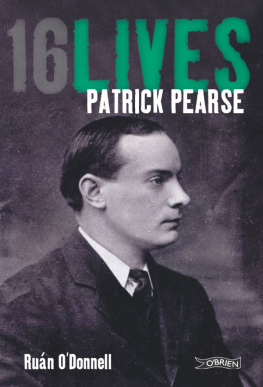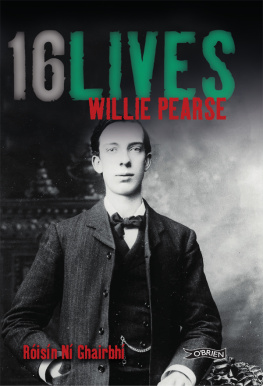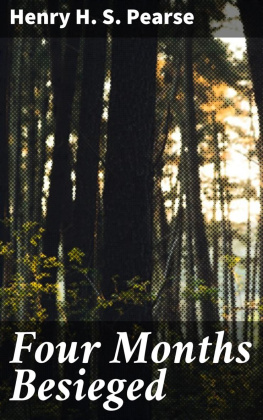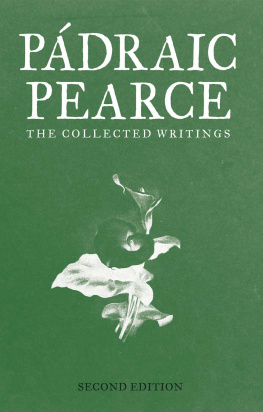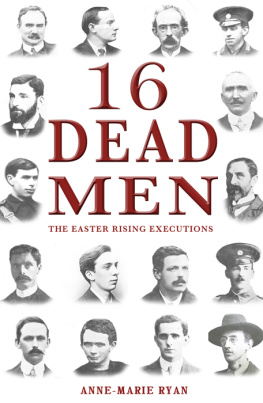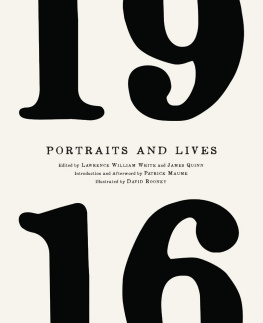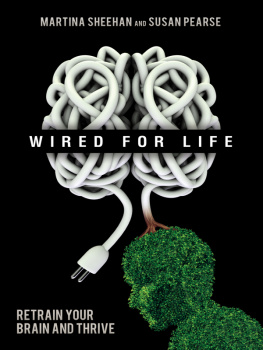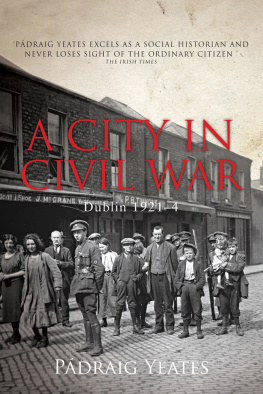
JAMES CONNOLLY Lorcan Collins
MICHAEL MALLIN Brian Hughes
JOSEPH PLUNKETT Honor O Brolchain
EDWARD DALY Helen Litton
SEN HEUSTON John Gibney
ROGER CASEMENT Angus Mitchell
SEN MACDIARMADA Brian Feeney
THOMAS CLARKE Helen Litton
AMONN CEANNT Mary Gallagher
THOMAS MACDONAGH Shane Kenna
WILLIE PEARSE Risn N Ghairbh
CON COLBERT John OCallaghan
JOHN MACBRIDE Donal Fallon
MICHAEL OHANRAHAN Conor Kostick
THOMAS KENT Meda Ryan
PATRICK PEARSE Run ODonnell
LORCAN COLLINS SERIES EDITOR

Lorcan Collins was born and raised in Dublin. A lifelong interest in Irish history led to the foundation of his hugely popular 1916 Rebellion Walking Tour in 1996. He co-authored The Easter Rising A Guide to Dublin in 1916 (OBrien Press, 2000) with Conor Kostick. His biography of James Connolly was published in the 16 Lives series in 2012, and his most recent book is 1916: The Rising Handbook. He is a regular contributor to radio, television and historical journals. 16 Lives is Lorcans concept, and he is co-editor of the series.
DR RUN ODONNELL SERIES EDITOR AND AUTHOR OF 16LIVES: PATRICK PEARSE

Dr Run ODonnell is a senior lecturer at the University of Limerick. A graduate of UCD and the Australian National University, ODonnell has published extensively on Irish Republicanism. His titles include Robert Emmet and the Rising of 1803; The Impact of the 1916 Rising (editor); Special Category: The IRA in English Prisons, 19681978 and 19781985; and The OBrien Pocket History of the Irish Famine. He is a director of the Irish Manuscripts Commission and a frequent contributor to the national and international media on the subject of Irish revolutionary history.

DEDICATION
In memory of Al ODonnell (19432015)
ACKNOWLEDGEMENTS
I wish to acknowledge the encouragement of Criostir de Barid, Mary Elizebeth Bartholomew, Ken Bergin, Rory and Patsy Buckley, Lorcan Collins, Tony Coughlan, Finbar Cullen, Jim Cullen, Dan Dennehy, Eamon Dillon, Eoin Dougan, Rita Edwards, Seamus Fitzpatrick, Jeff Leddin, Marcas and Leonora McCoinnaigh, Sean McKillen, Ger Maher, Patrick Miller, Dermot Moore, Mary Holt Moore, Brian Murphy, Risn N Ghairbh, Michael OBrien, Dick OCarroll, Labhras O Donnaile, Deasun O Loingain, Seamus OMathuna, Owen Rodgers, Charlene Vizzacherro, and Mary Webb (RIP). Thanks also to Maeve, Ruairi, Fiachra, Cormac and Saoirse ODonnell.
LIVES Timeline
184551. The Great Hunger in Ireland. One million people die and over the next decades millions more emigrate.
1858, 17 March. The Irish Republican Brotherhood, or Fenians, are formed with the express intention of overthrowing British rule in Ireland by whatever means necessary.
1867, February and March. Fenian Uprising.
1870, May. Home Rule movement founded by Isaac Butt, who had previously campaigned for amnesty for Fenian prisoners.
187981. The Land War. Violent agrarian agitation against English landlords.
1884, 1 November. The Gaelic Athletic Association founded immediately infiltrated by the Irish Republican Brotherhood (IRB).
1893, 31 July. Gaelic League founded by Douglas Hyde and Eoin MacNeill. The Gaelic Revival, a period of Irish nationalism, pride in the language, history, culture and sport.
1900, September. Cumann na nGaedheal (Irish Council) founded by Arthur Griffith.
190507. Cumann na nGaedheal, the Dungannon Clubs and the National Council are amalgamated to form Sinn Fin (We Ourselves).
1909, August. Countess Markievicz and Bulmer Hobson organise nationalist youths into Na Fianna ireann (Warriors of Ireland), a kind of boy scout brigade.
1912, April. Asquith introduces the Third Home Rule Bill to the British Parliament. Passed by the Commons and rejected by the Lords, the Bill would have to become law due to the Parliament Act. Home Rule expected to be introduced for Ireland by autumn 1914.
1913, January. Sir Edward Carson and James Craig set up Ulster Volunteer Force (UVF) with the intention of defending Ulster against Home Rule.
1913. Jim Larkin, founder of the Irish Transport and General Workers Union (ITGWU) calls for a workers strike for better pay and conditions.
1913, 31 August. Jim Larkin speaks at a banned rally on Sackville (OConnell) Street; Bloody Sunday.
1913, 23 November. James Connolly, Jack White and Jim Larkin establish the Irish Citizen Army (ICA) in order to protect strikers.
1913, 25 November. The Irish Volunteers are founded in Dublin to secure the rights and liberties common to all the people of Ireland.
1914, 20 March. Resignations of British officers force British government not to use British Army to enforce Home Rule, an event known as the Curragh Mutiny.
1914, 2 April. In Dublin, Agnes OFarrelly, Mary MacSwiney, Countess Markievicz and others establish Cumann na mBan as a womens volunteer force dedicated to establishing Irish freedom and assisting the Irish Volunteers.
1914, 24 April. A shipment of 25,000 rifles and 3 million rounds of ammunition is landed at Larne for the UVF.
1914, 26 July. Irish Volunteers unload a shipment of 900 rifles and 45,000 rounds of ammunition shipped from Germany aboard Erskine Childers yacht, the Asgard. British troops fire on crowd on Bachelors Walk, Dublin. Three citizens are killed.
1914, 4 August. Britain declares war on Germany. Home Rule for Ireland shelved for the duration of the First World War.
1914, 9 September. Meeting held at Gaelic League headquarters between IRB and other extreme republicans. Initial decision made to stage an uprising while Britain is at war.
1914, September. 170,000 leave the Volunteers and form the National Volunteers or Redmondites. Only 11,000 remain as the Irish Volunteers under Eoin MacNeill.
1915, MaySeptember. Military Council of the IRB is formed.
1915, 1 August. Pearse gives fiery oration at the funeral of Jeremiah ODonovan Rossa.
1916, 1922 January. James Connolly joins the IRB Military Council, thus ensuring that the ICA shall be involved in the Rising. Rising date confirmed for Easter.
1916, 20 April, 4.15 p.m. The Aud arrives at Tralee Bay, laden with 20,000 German rifles for the Rising. Captain Karl Spindler waits in vain for a signal from shore.
1916, 21 April, 2.15 a.m. Roger Casement and his two companions go ashore from U-19 and land on Banna Strand in Kerry. Casement is arrested at McKennas Fort.
6.30 p.m. The Aud is captured by the British Navy and forced to sail towards Cork harbour.
1916, 22 April, 9.30 a.m.
Next page
